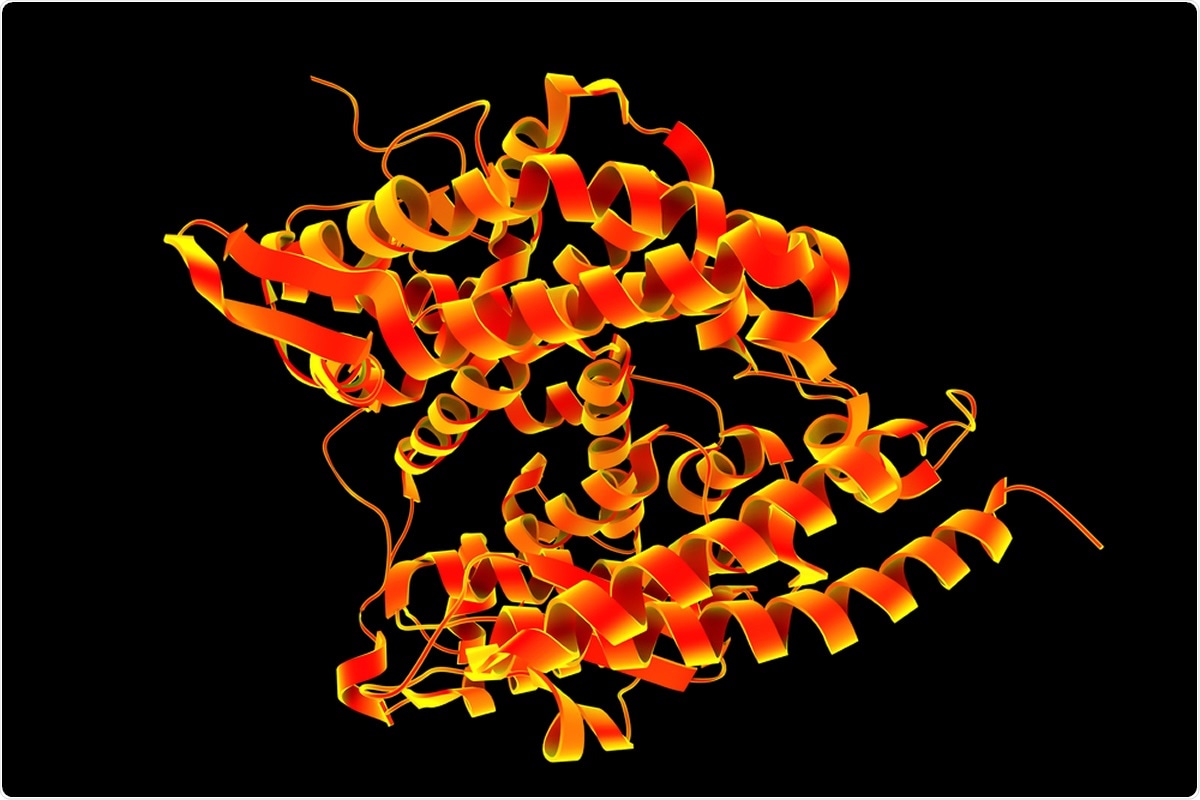There severe acute respiratory syndrome coronavirus 2 (SARS-CoV-2), the virus that causes the coronavirus disease (COVID-19), enters human cell hosts through the binding of the spike protein and angiotensin-converting enzyme 2 (ACE2) receptors.
Researchers at the Aarhus University, Denmark, found that high baseline levels of ACE2 in plasma from COVID-19 patients are tied to a worse outcome in hospitalized patients. The study, which appeared on the pre-print server medRxiv*, shows that measuring ACE2 levels in serum can help determine patients at a higher risk of developing severe illness from SARS-CoV-2 infection.
Study background
The SARS-CoV-2 infection occurs when a person inhales virus-laden respiratory droplets expelled when an infected individual coughs, sneezes, talks, or breaths. The condition may cause severe disease in those who are at high-risk, such as the elderly and people with comorbidities. These include heart disease, kidney illness, respiratory disease, diabetes, and hypertension, among others.
To cause infection, SARS-CoV-2 enters host cells through the binding of its spike protein to human ACE2 receptors, using membrane fusion and endocytosis.
ACE2 receptors are widely distributed in the human body, including the vascular endothelial cells, nasal and oral mucosa, smooth muscle cells, enterocytes in the intestines, and the type II alveolar pneumocytes in the lungs. This explains why COVID-19 affects many organs in the body and can potentially cause severe complications in some people.
ACE2 is part of the renin-angiotensin-aldosterone-system (RAAS). ACE2 opposes the effects of RAAS, attenuating increases in blood pressure. When RAAS is dysregulated, it can cause many diseases like hypertension and kidney illness.

Human ACE2 receptor, 3D illustration. Image Credit: Kateryna Kon / Shutterstock

 This news article was a review of a preliminary scientific report that had not undergone peer-review at the time of publication. Since its initial publication, the scientific report has now been peer reviewed and accepted for publication in a Scientific Journal. Links to the preliminary and peer-reviewed reports are available in the Sources section at the bottom of this article. View Sources
This news article was a review of a preliminary scientific report that had not undergone peer-review at the time of publication. Since its initial publication, the scientific report has now been peer reviewed and accepted for publication in a Scientific Journal. Links to the preliminary and peer-reviewed reports are available in the Sources section at the bottom of this article. View Sources
The study
In the study, the researchers aimed to determine if increased levels of ACE2 in the blood of COVID-19 patients could predict clinical outcomes.
To arrive at the study findings, the team used data from a large longitudinal study of 306 patients with COVID-19 and 78 patients without COVID-19. They collected clinical data, including clinical outcomes after 28 days.
To test the ACE2 serum levels, the team collected blood samples from positive patients on days 0, 3, and 7. Negative patients had their blood drawn on just the first day. The researchers tested the samples on the Olink Explore platform to measure ACE2 levels.
The team found that high baseline ACE2 levels in the plasma of COVID-19 patients are linked to the worse WHOmax category at 28 days. The WHOmax category, also known as the World Health Organization (WHO) COVID-19 outcomes scale, determines the severity of the illness. The lower the score, the more severe the infection outcome is.
Further, high levels of ACE2 in plasma from COVID-19 patients were markedly associated with a worse WHO category at the time of blood sampling at day 0, day 3, and day 7. Patients with hypertension had higher ACE2 plasma in the blood compared to those without hypertension.
Patients with comorbidities had higher ACE2 levels, including those with kidney disease and heart conditions. However, there was no difference in the plasma ACE2 levels in patients with diabetes, immunosuppressive conditions, and lung disease compared with those without these comorbidities.
Overall, the study suggests a potential role of measuring ACE2 in COVID-19 to predict disease outcomes. Also, ACE2 levels could provide a link between severe COVID-19 disease and the various risk factors.
The researchers speculate that high levels of ACE2 in the plasma could result from lysis of ACE2-expressing cells due to severe infection. They added that determining those who are more likely to experience severe symptoms will help in the treatment process.
“It is desirable to predict disease outcomes to specialize treatment since the drugs used in the treatment of COVID-19 can have deleterious side effects,” they explained.

 This news article was a review of a preliminary scientific report that had not undergone peer-review at the time of publication. Since its initial publication, the scientific report has now been peer reviewed and accepted for publication in a Scientific Journal. Links to the preliminary and peer-reviewed reports are available in the Sources section at the bottom of this article. View Sources
This news article was a review of a preliminary scientific report that had not undergone peer-review at the time of publication. Since its initial publication, the scientific report has now been peer reviewed and accepted for publication in a Scientific Journal. Links to the preliminary and peer-reviewed reports are available in the Sources section at the bottom of this article. View Sources
Journal references:
- Preliminary scientific report.
Kragstrup, T., Singh, H., and Grundberg, I. et al. (2021). Plasma ACE2 levels predict outcome of COVID-19 in hospitalized patients. medRxiv. https://www.medrxiv.org/content/10.1101/2021.03.08.21252819v1
- Peer reviewed and published scientific report.
Kragstrup, Tue W., Helene Søgaard Singh, Ida Grundberg, Ane Langkilde-Lauesen Nielsen, Felice Rivellese, Arnav Mehta, Marcia B. Goldberg, Michael R. Filbin, Per Qvist, and Bo Martin Bibby. 2021. “Plasma ACE2 Predicts Outcome of COVID-19 in Hospitalized Patients.” Edited by Michael Bader. PLOS ONE 16 (6): e0252799. https://doi.org/10.1371/journal.pone.0252799. https://journals.plos.org/plosone/article?id=10.1371/journal.pone.0252799.